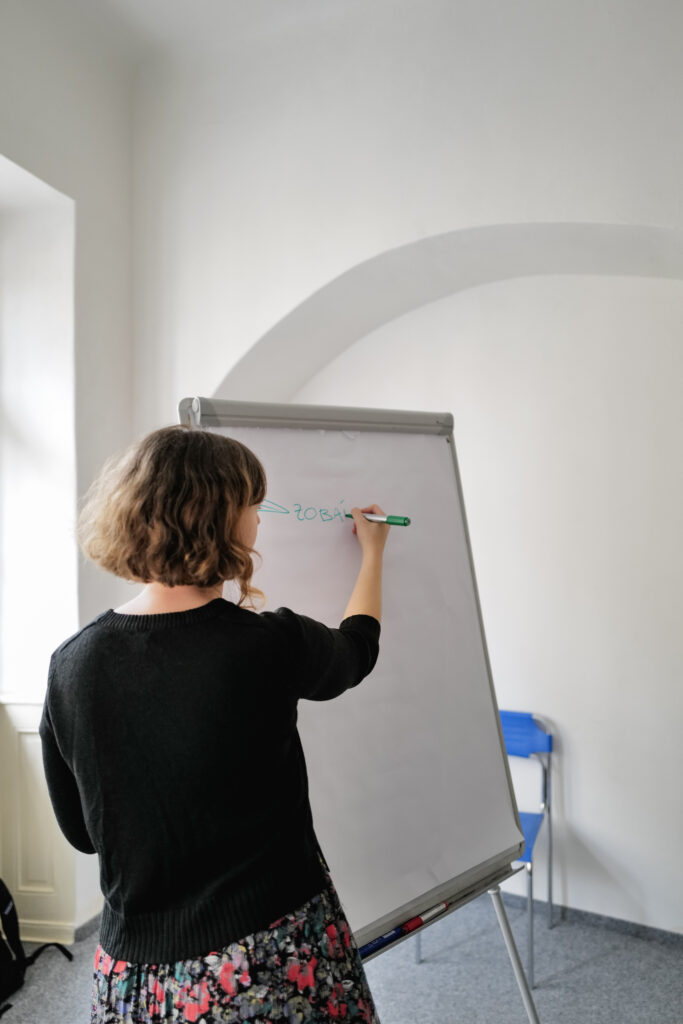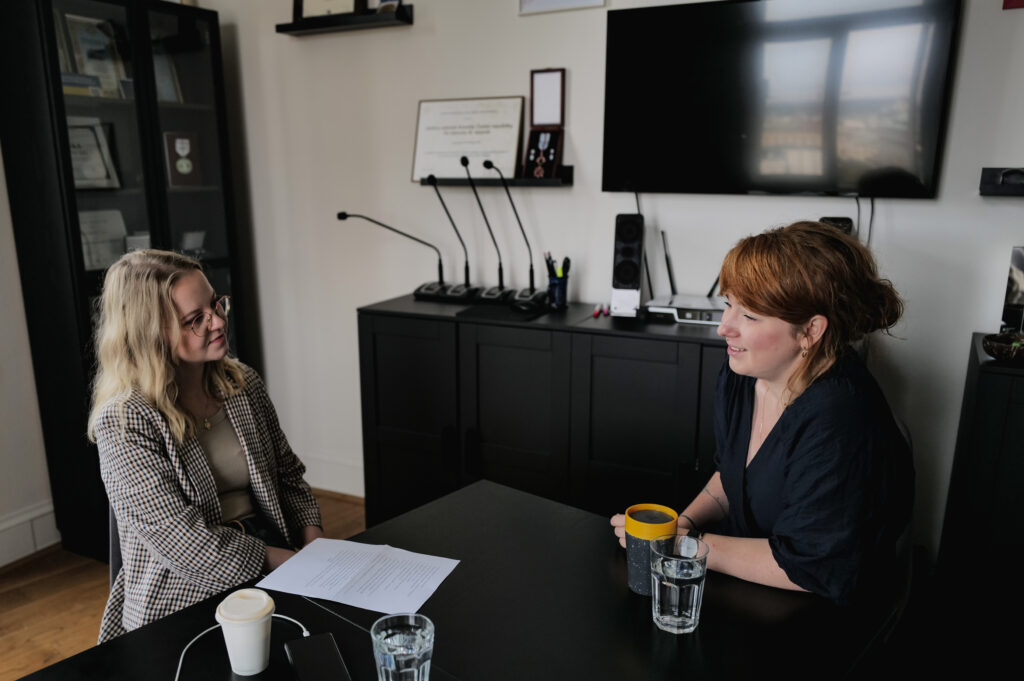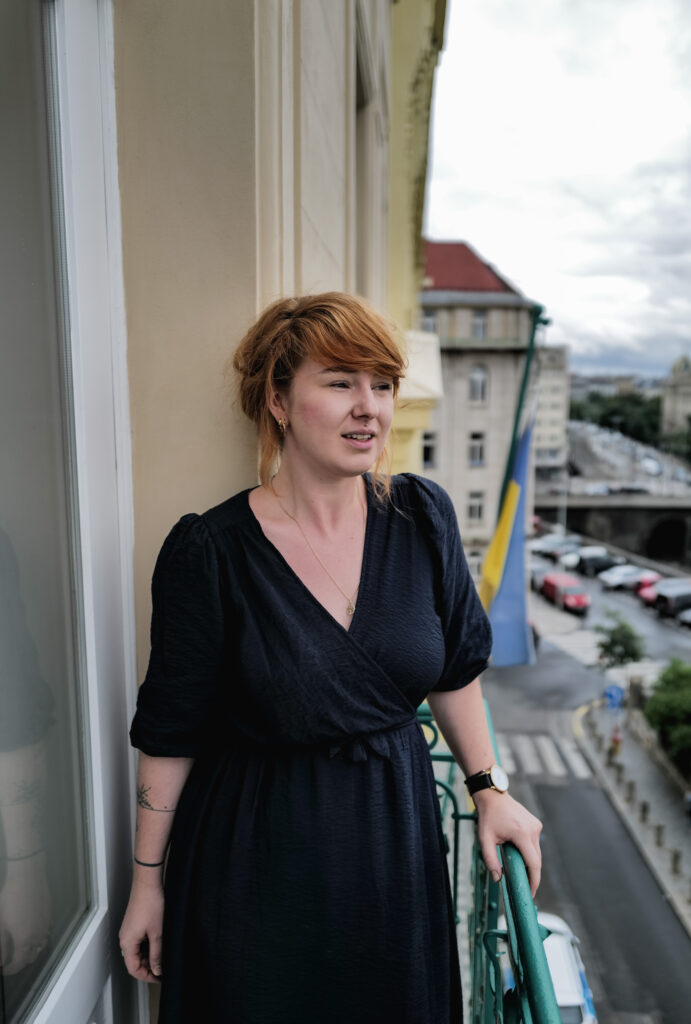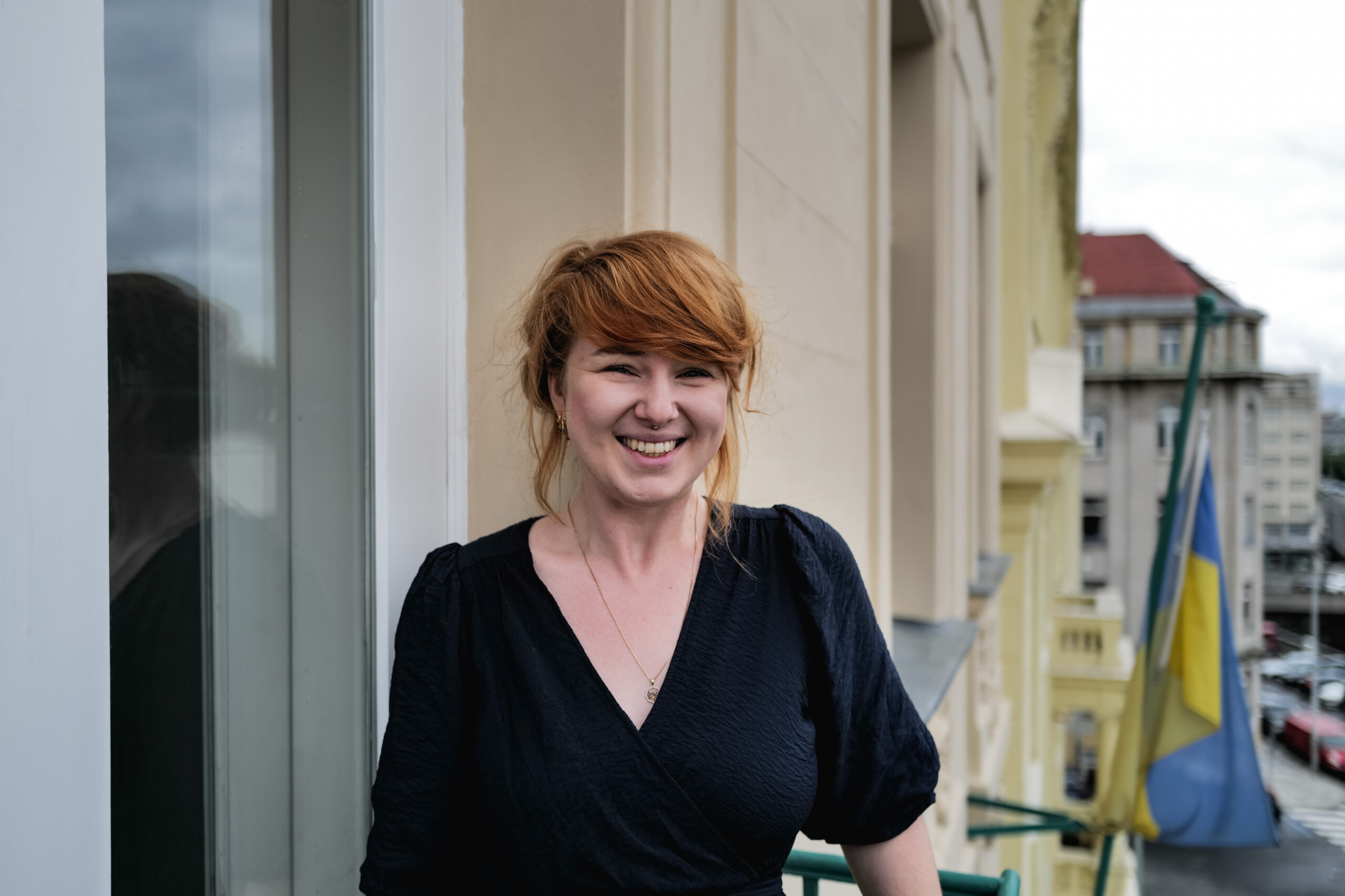The Adaptation center helps Ukrainian students who moved to the Czech Republic because of the war – either alone or with other family members. It provides them with career counseling, trips, leisure activities, as well as with a preparatory course to help them with transition to Czech schools. Dominika has been with the center since the very beginning.
You established the center quickly, you got into action in the first days of the war…
It was quite a ride! We knew that we needed to react quickly, the first Ukrainian students started coming to the Czech Republic immediately after the war broke out. Very soon we managed to get money from Seznam. Post Bellum is located in Vinohrady, but we needed to find separate premises for the center. These were arranged for us by Central Group – and we could use them for free. I asked Bonami for furnishings, HP donated technology to us… one word let to another and within three weeks we had the Adaptation Center ready. The solidarity in society was truly tremendous.
The adaptation center of the non-profit organization Post Bellum contributes to the education and adaptation of Ukrainian students who fled their homes to the Czech Republic. In addition to adaptation programs, the center also offers young Ukrainians career counseling, trips, leisure activities or studies in the year zero programme and preparation for entry into the Czech education system. The primary goal of the Adaptation Center is to make life in the Czech Republic easier for Ukrainian students. The adaptation center is supported by Seznam, Central Group, Bonami, HP, EPCG Foundation, the Prague City Hall, the Ministry of Education and others.
What about the center staff? How did you find teachers and other professionals?
We started looking for Ukrainian educators and subsequently put together a team of female teachers. Each had a different specialization, so we devised a system that allowed them to rotate through our classes. Then we put together a team of Czech teachers. We were contacted mostly by university students, mothers on parental leave or pensioners.

Why did you end up in the center?
The war greatly affected my life. I felt that if I didn’t start helping, I would go crazy. I consider it very fortunate that I can work in an organization that is dedicated to such projects of help. When I found out that I could put together the Adaptation Center, I took the challenge as part of my job – and as something that needed to be done.
What does Post Bellum do?
The flagship project of the non-governmental organization Post Bellum is the Memory of the Nations – a collection of stories of witnesses of key events of the 20th century. The goal of the organization is not only to record memories, but also to spread them in society. Post Bellum organizes exhibitions, social events, publishes books. The organization is also renowned in the field of education. The students like the project Stories of our Neighbors where they map the memories of witnesses from their region.
The center primarily serves students from 14 to 18 years of age. Why this age group?
We are strongly connected to pedagogues in the Czech Republic, and thus have up-to-date information from the school environment that we can pass on. We also have experience in opening a secondary school. In September 2021, our private humanities-oriented Grammar School of the Memory of the Nations welcomed its first students. Even on our educational projects, we mainly work with pupils of the second grade of elementary schools and the first grade of secondary schools. Very soon after the beginning of the invasion, it began to occur to us that many Ukrainian students of this age would arrive in the Czech Republic and that it would be impossible for them to fit into Czech secondary schools. The capacity of secondary education institutions in the Czech Republic, and in Prague in particular, has been exhausted for a long time. But it worked! We eventually got students into the schools, but it was a struggle.
Post Bellum and Ukraine
The organization started helping Ukraine almost immediately by fundraising. During the first ten days of the war, donors contributed 170 million crowns to it. The fundraising is still ongoing, and the collected money is mainly used to buy medical and protective equipment. Ukrainian aid is coordinated by Martin Ocknecht, who himself has traveled to Ukraine several times. But the connection between Post Bellum and Ukraine has deeper roots. The branch of the organization is located in Kyiv. Documentarians record the stories of Ukrainian witnesses there.
It was originally supposed to be a short-term project, but the doors of the Adaptation Center are still open. Why do you continue?
First, we started with the educational adaptation program, which was supposed to last three and a half months. It was attended by plus or minus sixty students. The turnover was high in the beginning. The goal was not for our students to fulfill compulsory attendance every day. We wanted to give them a space where they would feel safe, where they would have a sense of a schedule and spend time with their peers. We also thought about adaptation, so we introduced them to Czech students, took them to cultural events, involved them in Post Bellum events and helped them with whatever was needed. As everything was going well, additional funds began to be released. Thanks to them we could continue. We have put together a year zero programme for those interested in entering secondary schools. It was held every morning and visited by 36 students – the turnover was lower there. The project was a success, so we keep on going. In September 2023, we are opening another year zero. We already have over 60 applicants.
A significant part of the lessons consists of the Czech language…
We focus especially on its grammatical side, so that students can list parts of speech, understand syntax and sentence structure. Then, of course, we place great emphasis on conversational Czech. This is an easy task for Ukrainian students because they hear it around them. In addition, Czech is very similar to Ukrainian. Students tend to have the biggest problem with written speech – Latin alphabet and alphabet are two completely different systems. Then we have academic Czech, which is taught by university students. For example, a mathematics student came to us. He explained the theory of the subject to the Ukrainian students and at the same time taught them the necessary terminology in Czech. We also teach English at the center with a teacher from Ukraine, and psychology – we work with a psychotherapist and also offer the option of individual sessions.
Did the students teach you Ukrainian in return?
During the first days, I learned the word for tape and “наречена”, the word which has the same meaning in Czech – a bride. Gradually, we began to understand each other more and more. They spoke to me in Ukrainian and I answered in Czech.

What other activities does the Adaptation Center offer?
We are showing Prague to students. Of course, we also travel outside the city. We also offer career counseling. We help with choosing a school, submitting an application, with administrative matters, phone calls. The initial confusion was not only among parents and students, but also at schools. Our Ukrainian teachers, who at that time were already very proficient in Czech, communicated with the schools on their own.
So did “your” Ukrainian students get into secondary schools thanks to the center?
It is not the case that all 36 students started going to school, but those who decided to study did. And not only in secondary school, but also in universities. There are big differences between the school system in Ukraine and the Czech Republic. For students of this age, entering secondary school is not the only option. They can finish high school in Ukraine online, it doesn’t last four years, but two years. Then they get a report card, which is equivalent to our secondary school diploma, and if they want, they go on to college. One third of our students decided to go to a Czech secondary school, one third straight to university, and the last third continues to study at a Ukrainian school and will see.
Do you keep in touch with the students, even if they no longer come to the center?
Just yesterday, one of the students wrote to me that he got into three universities. We communicate with each other all the time. We spent a lot of time together and became true friends, a community that helps each other.
So you are really close. Do they come to you with their problems?
We had a few students who are completely alone in the Czech Republic. Of course, we solve housing and financial problems, non-stop requests for part-time jobs or finding a therapist. I think the financial problems are the strongest. It happened several times that students could no longer come to us and had to go to work.

Can you remember the moment when you said to yourself “this is really worth it”?
There are an incredible number of such moments. Through the stories I hear, my view of the world has really changed. I will never forget them. Dominika before the Adaptation Center is different from Dominika after it. The gratitude that the students express to me, the moments full of all the emotions… I enjoy every day spent together, conversations and laughter. I admire the courage I see in the students, the determination to learn the language and then communicate. They convince me every day that my work has meaning.
On the other hand, can you remember a moment when it was just all too much for you?
On the very first day, when we opened the Adaptation Center, I called my colleague that not only our students needed therapeutic support, but also the whole team and me. The beginnings were very difficult. Although the students were laughing and living normally, their gazes were completely blank. Every day I listened to different stories. Coping with them was very challenging. Working in the Adaptation Center is mentally demanding.
“If I didn’t start helping, I would go crazy.”
Have you ever encountered negative comments towards the Adaptation Center and what you do?
Sometimes it happens that we go by a bus outside of Prague and the passengers don’t like that our students are talking to each other, because they should be quiet and ideally not be in the Czech Republic at all. There were quite a few such insinuations and xenophobic comments.
When the situation calms down, would you like to visit Ukraine?
The girls-teachers and I had already agreed that I would visit them all. I’m looking forward to it so much. Hopefully soon…
Dominika Kopčiková
Head of the Adaptation Center and Post Bellum Education Department
Dominika Kopčiková was born in Kutná Hora. She studied English at the University of Pardubice. She has always been fascinated by the 20th century. Further study steps led her to Charles University, where she is currently completing her studies in the field of Oral History and Contemporary History. It was there that she connected with the Post Bellum organization and the Memory of the Nations project. Dominika started working in the educational department as a producer of educational projects (film stories, workshops). “Time passed and I received new challenges, to which I said yes.” The circumstances of the war in Ukraine led her to build the Adaptation Center. Now another big challenge awaits her – she will lead the entire education department of the Post Bellum organization.
